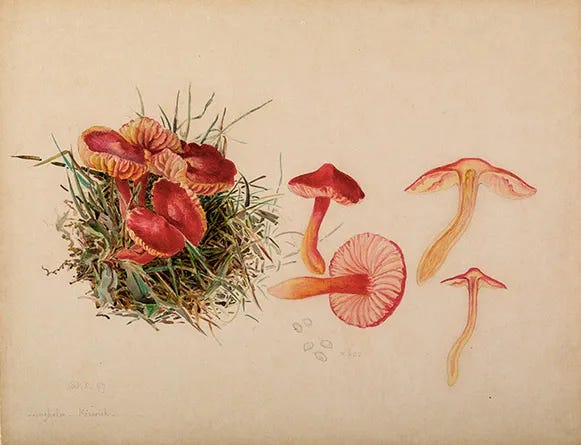'Vegetation's Juggler'
Emily Dickinson, a LitHits favourite, wrote brilliantly about life in all its dimensions, from success, love, death, despair, light, and solitude to...mushrooms
The Mushroom is the Elf of Plants - At Evening, it is not At Morning, in a Truffled Hut It stop opon a Spot As if it tarried always And yet it’s whole Career Is shorter than a Snake’s Delay - And fleeter than a Tare - ’Tis Vegetation’s Juggler - The Germ of Alibi - Doth like a Bubble antedate And like a Bubble, hie - I feel as if the Grass was pleased To have it intermit - This surreptitious Scion Of Summer’s circumspect. Had Nature any supple Face Or could she one contemn - Had Nature an Apostate - That Mushroom - it is Him!

What we love about this poem…
It feels like an ode (a lyric poem that addresses and often celebrates a person, place, thing, or idea, like ‘beauty’ and ‘truth’)—yet it’s not the standard subject matter for one. The poet lavishes attention upon the humble mushroom, singing its praises in the most exalted terms (what does ‘the Germ of Alibi’ even mean?) and then reins herself in with a final line that’s almost childishly sweet. It’s typical of Dickinson to notice things the rest of us might overlook or take for granted, and to invest them with dignity, wonder, and wit.
About the Author
Emily Dickinson (1830-86) is one of the most important and innovative American poets. She spent most of her life in Amherst, Massachusetts, living reclusively but writing constantly, both poetry and letters. Her work was published after her death and became an instant success.
She once described the power of poetry as something that ‘takes the top of your head off’. Her poetry is also curiously rife with spelling and punctuation mistakes, sometimes deliberate (she loved to play with language and typography), sometimes unintentional. You can read more here about Dickinson’s ‘error’s’ and their significance.
Dickinson is a popular choice for us, and you can read past newsletters featuring her poems: ‘This World is not Conclusion’, ‘The Brain is Wider than the Sky’, ‘Hope is the Thing with Feathers’, and ‘There’s a Certain Slant of Light’ — this last one featuring another interesting use of the word ‘slant.’
To read alongside…
Shakespeare may have been in Dickinson’s mind when she penned this poem, as it echoes Prospero’s lines in The Tempest about how elves ‘make midnight mushrooms’.
Huge mushrooms dot the dreamscape of Alice’s Adventures in Wonderland (1865) by Lewis Carroll. On one of these sits a Caterpillar who tells Alice that one side of the mushroom will make her taller and the other side will make her shorter. Sure enough, she finds that one side makes her shrink, while another makes her neck so long that she grows up into the trees.
This theme of mushrooms having magical properties runs through much subsequent literature. For example, in H.G. Wells’s The Purple Pileus a mushroom radically alters the course of a man’s life. William Hope Hodgson’s ‘The Voice in the Night’ (1907) and H.P. Lovecraft’s ‘The Whisperer in Darkness’ (1931) capture the classic creepiness of mushrooms in the dark. Mushrooms and the fairy world are an old theme too. The tale 'Mushrooms' in Alexander Afanasyev’s collected Russian Fairy Stories (1855-63), which contains folk stories from Russia, Ukraine and Belarus, begins:
‘A cep fell to thinking, and came to a decision. Sitting under an oak, looking at all the other fungi, he began as follows:
“You, white agarics, go to war with me,”…’
In this brief story, talking mushroom types are framed through their cultural positioning as both a richly traditional food and yet also the dangerous anti-food of the dead. The story hints at their growth in the dark moist forest floors; looking in the forest for mushrooms is itself risky. In many folktales, mushroom-gathering could very well lead to an encounter with the terrifying Baba Yaga!
There is a wealth of literature devoted to fungi more broadly…for starters, try the stories of Jeff VanderMeer, Jane Hertenstein, Paul Tremblay, Lisa M Bradley, Polenth Blake, Nick Mamatas, Ian Rogers, and Ann K Schwader.
Suggest a LitHit!
Tell us your own favourites from literature you've read, and we can feature you as a Guest Curator. Just email us with the following information:
Your full name
The title of the book you're suggesting
The location of the excerpt within the book (e.g., "in the middle of chapter 5"), or the excerpt itself copied into the email or attached to it (in Word)
Why you love it, in just a few sentences
About LitHits
LitHits helps you make time for reading by bringing you unabridged excerpts from brilliant literature that you can read on the go, anytime or any place. Our curators carefully select and frame each excerpt so that you can dive right in. We are more than a book recommendation site: we connect you with a powerful, enduring piece of literature, served directly to your mobile phone, tablet or computer.
You might also enjoy...
Feedback
We'd love to hear your thoughts on our newsletter:
kshepherdb@yahoo.co.uk
Graphic design by Sara Azmy
All curation content © 2024 LitHits. All rights reserved.



